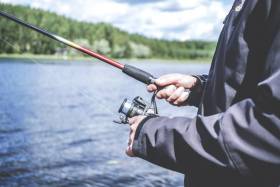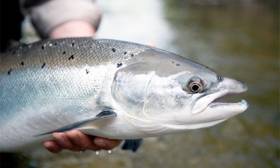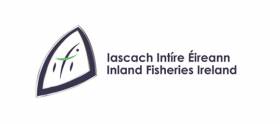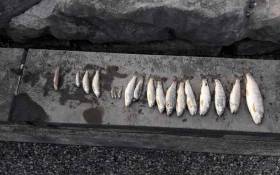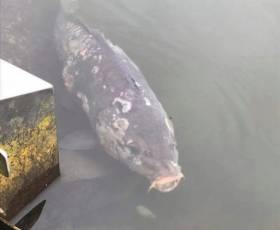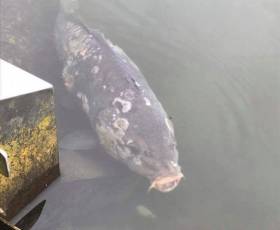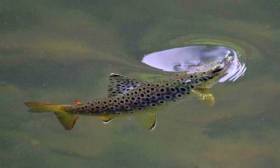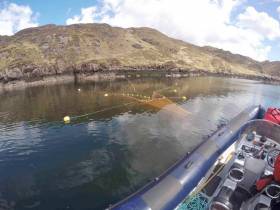Displaying items by tag: Inland Fisheries Ireland
73 Angling Initiatives Nationwide To Receive Funding
#Angling - Inland Fisheries Ireland yesterday (Thursday 21 June) announced the beneficiaries of its 2018 Sponsorship Programme, which supports angling events and initiatives across the country.
The scheme will financially support 63 events to be held in Ireland, and a further 10 juvenile and women’s events to be held overseas, to the overall tune of €30,000 — with a focus on those which help grow Ireland’s angling tourism product and support novice anglers.
A number of other events around the country will receive assistance from IFI staff during the year, along with promotional support and the use of IFI biosecurity equipment to prevent the spread of invasive species.
This year, Inland Fisheries Ireland’s Sponsorship Programme will support:
- 19 international angling events which will be held in Ireland.
- 10 Irish angling teams travelling overseas to international angling events.
- 28 coaching/juvenile events/competitions aimed at novice and young anglers.
- 14 national and local angling events held in Ireland for domestic participants.
- 2 seminars which will help the exchange of information, ideas and practical experiences on fisheries management.
The angling initiatives, spanning 22 counties, will be supported through financial aid and, where possible, through resource support from Inland Fisheries Ireland staff members.
This year’s IFI Sponsorship Programme was announced in January with applications invited from anglers, angling clubs and organisations nationwide. In total, there were over 100 applications to the 2018 programme.
IFI’s head of business development Suzanne Campion said: “With Ireland having some of the best wild fisheries in Europe, this annual Sponsorship Programme forms part of our National Strategy for Angling Development, which aims to develop our angling tourism potential, while also managing and conserving our fisheries resource.
“Tourism initiatives like the Wild Atlantic Way and Ireland’s Ancient East are further boosting visitor numbers and our Sponsorship Programme for 2018 will support angling clubs and groups nationwide to offer local events which engage domestic anglers, overseas anglers and those who are about to cast for the first time.”
Recreational angling is estimated to contribute over €800 million to Ireland’s economy on an annual basis, supporting upwards of 11,000 jobs.
According to IFI, angling offers rural communities the opportunity to increase the number of visitors to the area and, in turn, support local business and create jobs by providing a sustainable source of income for both catering and accommodation services.
IFI 2018 Sponsorship Programme Beneficiaries List
Cavan
- Cootehill IFI Fishing Festival: five-day coarse fishing festival at Cootehill, organised by Cootehill Fishing Festival.
- Arvagh Breffni Seniors event: angling competition at Arvagh lakes over five days, organised by Arvagh Angling Holidays
- Arvagh International Coarse Fishing Festival: angling competition at Arvagh lakes, organised by Arvagh Angling Holidays.
- Arvagh King of Clubs: angling competition at Arvagh lakes, organised by Arvagh Angling Holidays.
- Arvagh Breffni Open: angling competition at Arvagh lakes, Arvagh Angling Holidays.
- Romanian Catch and Release Angling Association’s lure fishing competition at Lough Ramor, organised by the Romanian C&R Angling Association.
- Feeder fishing three-day event: Barnagrove Lake and Lough Sillan, organised by C/M Lakelands Feeder Club.
- Building Angling Tourism Potential in Leitrim & Cavan: workshop format event at Slieve Russell Hotel, Ballyconnell, organised by Upper Shannon Erne Future Economy Project.
Cavan/Leitrim - World Pairs Angling Championships: Shannon-Erne region, organised by World Pairs Angling.
- All Ireland Championships Senior & Ladies: Shannon Erne and various locations in counties Cavan and Leitrim, organised by the National Coarse Fishing Federation of Ireland, celebrating 60th anniversary.
Clare
- International Angling Week 2018: shore angling competition, Fanore, organised by Lisdoonvarna Fanore Sea Angling Club.
- Predator Battle Ireland: European angling competition, Lough Derg, Clare/Tipperary/Galway/Limerick, organised by Predator Battle Ireland.
- Trout Angling Competition: iuvenile angling competition, Lough Derg, Clare/Tipperary/Galway/Limerick, organised by Molamphy.
Cork
- Cork Small Boats Festival 2018: bring-your-own-boat sea angling festival, Cork Harbour area, organised by Cork Small Boats Festival Committee.
- SALC - Home Nations Boat (Seniors) 2018: boat sea-angling competition, Cobh, organised by Irish Federation of Sea Anglers.
- Defence Forces Sea Angling: boat competition, Crosshaven, organised by DFSAC.
- Tibbotstown Reservoir Initial Stocking: stocking of brown trout, reservoir, organised by Glanmire & District Salmon & Trout Anglers Association.
- Introduction to Game Angling Course: Tibbotstown Reservoir, Carrigtwohill, organised by Glanmire & District Salmon & Trout Anglers Association.
- Introduction to Angling: eight-week introductory course on angling, River Bride, Rathcormac, organised by Rathcormac Angling Hub.
- Fly-tying for beginners: eight-week fly-tying course, Rathcormac Community Centre, organised by Rathcormac Angling Hub.
- Introduction to Invertebrates and Entomology: three-week course, River Bride, Rathcormac, organised by Rathcormac Angling Hub.
Dublin
- Weekly Educational Workshops: on a weekly basis KAI hosts an hour-long workshop to help introduce youths to angling, Killinarden Community Centre, organised by Killinarden Angling Initiative (KAI).
- Monthly youth angling field trips: once a month (the last Saturday) KAI brings 20 youths on an angling trip to put into practice what they have been learning in the weekly workshops, various locations/counties (canals, lakes, rivers and beach), organised by Killinarden Angling Initiative.
Galway
- Police International Fly Fishing/Home Nations Competition: three-day trout fly fishing competition between the police forces of Ireland, Northern Ireland, England, Scotland and Wales, Lough Corrib, Green Fields Bay, organised by Garda Trout and Salmon Anglers Club.
Kerry
- Tag-a-Ray: a competition that encourages anglers to become involved in tagging and to increase awareness of conservation, Tralee Bay, organised by Tralee Bay SAC.
Kildare
- TAFI youth training day: training for TAFI youth anglers in Leinster, River Slate, organised by Rathangan Trout and Salmon Anglers Association.
Kilkenny
- Annual Junior Fishing Competition: fishing competition for Under-14s, The Nore, organised by Kilkenny City and County Anglers.
Leitrim
- Ballinamore Coarse Angling Festival: five-day coarse angling festival, Shannon-Erne, organised by Lakelands Angling Ballinamore.
- All-Ireland Championships Senior & Ladies, National Coarse Angling Championships - 60th Anniversary, Shannon-Erne, Cavan/Leitrim, organised by National Coarse Fishing Federation of Ireland.
Limerick
- Glin Shannon river fishing: shore fishing on estuary, lay-by beyond Glin Pier, organised by Glin Development Association
Shannon, Mulkear and District Anglers Association - Catch and Release Salmon Angling competition, ‘The Haunt’, Mulcair River, organised by William O'Halloran.
Mayo
- Spring International Fly Fishing Match: international fly fishing competition comprising of teams from Ireland, England, Scotland and Wales, Lough Mask, Cushlough Bay, Ballinrobe, organised by Irish Trout Fly Fishing Association (ITFFA).
- Newport SAC 52nd Annual Sea Angling Festival: combined shore and boat angling competition, open to all anglers, Clew Bay, Co Mayo, organised by Newport Sea Angling Club.
- Junior-branch shore angling training: teaching the younger members of the club the joys of shore angling, various shore-based locations around Clew Bay, organised by Newport Sea Angling Club.
- National Junior Competition (Daniel Peacock Memorial): 26th Anniversary of a Juniors-only sea angling competition, Clew Bay, organised by Newport Sea Angling Club.
- RBM Fisheries Petals Cup Ladies Sea Angling Competition: ladies’ sea angling competition from novice to experienced, Clew Bay, organised by RBM Fisheries.
Meath
- Boyne Valley Fishing Hub: angling for beginners, River Boyne, Trim, organised by Boyne Valley Hub.
- Summer Youth Programme: series of coaching evening sessions targeting local youth, Royal Canal at Enfield, organised by Royal Enfield Coarse Angling Club.
Monaghan
- Junior Summer Camp 2018: introducing Juniors to the basics of angling and fish care, Lisanisk Lake, organised by Carrickmacross Coarse Angling & Junior Development Club.
Offaly
- Edenderry Coarse Angling Six-Day Gala Week, Grand Canal, Edenderry area, Edenderry Coarse Angling Club.
- The Daingean teams-of-four angling festival: four-person teams event with the aim of bringing teams to the Grand Canal in Offaly from across the world, Grand Canal, organised by Daingean Angling Club.
- Junior Anglers 2018: seven-week coarse angling for under-18s, Grand Canal, Tullamore, organised by Tullamore and District Angling Club.
- Angling Awareness Competition, Grand Canal, organised by Belmont and District Fishing Club.
Roscommon
- Fishbook Open Fly Competition: first-ever meeting of members for an all charitable catch and release, fly only for trout completion, Lough Key, organised by Fishbook Ireland.
- Cuisle Angling Event, River Suck, Donamon, organised by Cuisle Holiday Centre.
- Building Angling Tourism Potential in Roscommon & Longford: workshop part of a series, Keenan’s Hotel, Termonbarry, organised by Upper Shannon Erne Future Economy Project.
Waterford
- Disability outreach programme at Ballyshunnock, organised by St Paul’s Fishing Club.
- Rinnashark Sea Angling Club Small Boats Angling Festival: small boats species hunt angling competition, at Dunmore East, organised by Rinnashark SAC.
- Junior League: six coaching and competition sessions, Ballyshunnock, River Barrow, Oaklands, organised by Waterford and District Coarse Angling Club.
Westmeath
- Introduction to coarse angling for juniors: includes tuition session in the basics of coarse angling for Juniors, venue tbc, organised by Navan Coarse Angling Club.
- Lough Ree International Pike Classic: three-day predator competition featuring 100 boats and 50 international and international competitors, Lough Ree - launching at Ballyleague & Lanesborough, organised by Lough Ree Angling Hub.
- Lanesborough International Coarse Fishing Championships: three-day international fishing competition with competitors from UK, rest of Europe and Ireland, three different locations - this year, the Royal Canal for first time, includes Roscommon and Longford fisheries, organised by Lough Ree Angling Hub.
- Lough Ree International Pike Festival and World Cup: three days of pike fishing on the fabulous Lough Ree with 100 boats taking part from Ireland, Germany, Austria, Belgium, England and Northern Ireland, organised by Lough Ree International Pike Festival and World Cup (Athlone Anglers Association).
- Junior All Ireland Pike Fishing Championships: series of under-18s Pike fishing competitions, organised by Leinster Pike Angling Club.
Wexford
- 33rd Annual Rosslare Small Boats Festival: small boat angling species hunt, Kilmore Quay, organised by Small Boat Anglers of the UK & Ireland.
- Irish Winter Shore Angling Festival: three-day shore angling competition, Kilmuckridge, organised by European Federation of Sea Anglers.
- Dunbrody Festival: two-day coarse angling festival, organised by Oaklands Coarse Angling Club.
Wicklow
- Novice Angler Introduction to Boat Angling: practical boat angling with introduction/coaching, Wicklow Port, organised by Wicklow Bay Sea Angling Club.
- Youth Boat Angling Coaching: introduction and coaching for youth in boat angling, Wicklow Port & Kilmore Quay, organised Leinster Provincial Council.
- Angling Coaching – Shore: introduction and coaching for youth, venue TBC, organised by Leinster Provincial Council.
#Fishing - Sean Kyne TD, Minister with responsibility for the inland fisheries sector, today (Thursday 21 June) welcomed the positive outcome from the international discussions at the North Atlantic Salmon Conservation Organisation (NASCO) annual meeting in Portland, Maine, USA.
“Our departmental officials and those of Inland Fisheries Ireland represented Ireland at the negotiations as part of the EU delegation,” Minister Kyne said. “They joined delegates from the EU, USA, Canada, Norway, the Russian Federation, Greenland and the Faroes.
“The outcome of the week-long discussions is that, for the period 2019-2022, no harvest fishery will take place off the Faroe Islands and the restrictions on the fishery off West Greenland have been strengthened.
“I am pleased that these two important regulatory measures were agreed in a spirit of international c-ooperation.”
Minister Kyne emphasised the importance of these measures for Irish salmon migrating to distant feeding grounds before returning to their natal rivers in adulthood to spawn.
“The migratory stock complex travelling through Faroese waters comprises a majority component of European river stocks, including those from Ireland, and the measure to have no commercial fishing in these waters is important for these vulnerable stocks,” he said.
“I am particularly pleased that the discussions on the Faroes area were chaired by Ireland, on behalf of the EU.”
The majority component of the stock complex migrating to Greenlandic waters originates from the North American continent, and the restriction on fishing in this area assists these stocks as well as the smaller European component.
The agreed level of potential catch, for the internal use fishery in Greenland, is reduced by some 33% over the quota set in each of the last three years. Agreement was also reached on increased monitoring and control of the fishery.
The NASCO meeting also considered the factors that affect the marine survival of Atlantic salmon, with scientists, including those from IFI, engaged in cutting edge work to identify and address those causes.
Determining why salmon are dying at sea before they can come back to their natal rivers to spawn is a key research priority.
A new innovative approach to oceanic long range acoustic monitoring, ‘ROAM’ (RAFOS Ocean Acoustic Monitoring), will allow salmon to be tracked through the marine environment. The approach is intended to overcome many of the significant challenges associated with tracking Atlantic salmon throughout their extensive marine migration.
Minister Kyne concluded that the measures taken in Ireland, over a decade ago, to protect migratory salmon stocks have pointed the way internationally and the latest agreements at NASCO demonstrate restraints on exploiting Irish and other stocks as they migrate outside our waters.
#Angling - The Salmon Conservation and Midland Fisheries Funds are now open to projects for habitat restoration and conservation, as announced earlier this week by Sean Kyne TD, Minister of State with responsibility for inland fisheries.
The closing date for applications to these schemes, as part of Inland Fisheries Ireland’s (IFI) National Strategy for Angling Development, is Thursday 12 July.
The National Strategy for Angling Development aims to ensure that Ireland’s fish stocks and angling infrastructure are protected and enhanced with a view to ensuring a sustainable habitat and delivering the economic, health and recreational benefits they offer to communities across Ireland.
The Salmon Conservation Fund is generated from the sale of salmon and sea-trout licences and reinvested in projects that will assist in the conservation of salmon.
“As the Conservation Fund is financed via a portion of licence sales for both Salmon and Sea Trout, I asked IFI to develop a revised scheme that will include sea trout conservation projects and update the existing salmon-only scheme,” Minister Kyne said.
“As a first step to realising a full scheme for sea trout, this year’s fund is open to accepting a pilot sea trout project for the Waterville area.”
Applications to the Salmon Conservation and Midland Fisheries Funds must relate to conservation habitat improvement projects.
Applications may be made online and are invited for projects that are ‘ready to go’, ie that have all the necessary paperwork and permissions in place and can move to delivery following successful progression through evaluation and award stages. Such projects would include, for example, a second or subsequent phase of an existing scheme.
Successful applications must meet the requirements of the IFI Environmental Assessment process.
IFI’s current priority is to ensure projects already awarded funding under the recent National Strategy for Angling Development schemes up to and including 2017 are completed and project officers continue to assist applicants to bring these projects to delivery phase.
To this end, project officers are engaging with groups and other Government agencies. Ready-to-go projects should be timed to complete by end of September 2018.
Meanwhile, IFI has issued an appeal to farmers to remain vigilant during the summer months when harvesting silage and spreading slurry to avoid water pollution and the loss of nutrients into rivers, lakes and other watercourses.
The appeal comes on the back of last week’s major fish kill in Claremorris, where over 1,000 wild brown trout and other species died as a result of a suspected agricultural silage leak.
Silage operations will be ongoing all summer and silage effluent has the potential to cause devastating pollution in streams and rivers.
Such effluent is a significant polluting substance, starving fish and invertebrate life of oxygen, resulting in potentially massive fish kills if it enters a watercourse.
With some rivers low during summertime with little dilution capacity, the effect of a small leak can cause huge damage.
IFI is advising farmers to follow its simple six-point plan to ensure good farmyard management and reduce their risk of polluting:
- Use round bales as the most environmentally friendly way to store silage.
- If a silage pit is being used, ensure it is properly sealed to prevent leakage from under the slab.
- Carry out slurry spreading in dry weather and never when heavy rain is forecast.
- Never spread slurry close to a watercourse, be aware of the slope of land to the watercourse.
- Do not clean tanks beside any watercourse, stream or a river.
- Do not allow any effluent or washings to enter any rainwater gully.
On Thursday 17 May, 2018 Inland Fisheries Ireland received a report of a fish kill on Ballycorrigan stream and near the confluence with the River Shannon in Ballina, Co. Tipperary. Staff observed approximately 100 brown trout of various age groups, three juvenile salmon and a stone loach dead in an approximately 100 m stretch from the Ballina Waste Water Treatment Plant discharge pipe to the confluence with the River Shannon. There are live fish upstream of the WWTP.
According to IFI, preliminary investigations have indicated that maintenance works carried out during the day in the Ballina WWTP may have caused 'a deleterious or polluting effluent to discharge to this stretch of river causing the observed fish mortality'.
IFI are continuing to investigate the cause of the fish mortality and are working with Irish Water and the EPA in this regard.
Cork City Fish Kill: Carp Test Positive For Edema Virus
#Angling - Scientists of the Fish Health Unit at the Marine Institute have advised that sample carp taken from The Lough and Belvelly Lake in Cork have tested positive for carp edema virus, or CEV.
The poxvirus causes a disease known as ‘koi sleepy disease’ in both koi and common carp.
The fish kill was first reported at The Lough in Cork city centre last week, with subsequent reports at Belvelly Lake in Cobh. Some 450 carp were removed from the former, and over 20 from the latter, as well as live samples from both for analysis.
At present, while tests are ongoing and further tests are carried out on the CEV detected, this is being treated as a ‘suspect positive’ and is not confirmed as the causative agent of the mortalities until all tests have been completed.
Inland Fisheries Ireland (IFI) recommends that stringent biosecurity protocols continue to be implemented. All mortalities continue to be removed and disposed of in a bio-secure manner.
Angling remains suspended at both locations, as well as at Inniscarra and Carrigadrohid Reservoirs.
#Angling - Inland Fisheries Ireland yesterday (Friday 4 May) responded to reports of a fish kill at The Lough in Cork city centre.
The reports were received from Cork Carp Anglers Club who recorded a number of dead fish at this iconic Cork carp fishery.
Initial investigations by IFI indicate the cause of death to be a fish health issue, with a bacterial or fungal infection suspected of causing the mortalities.
It is estimated that in the region of 200 carp have been infected in this outbreak.
A small number of live fish have been securely transported to a specialist fish health unit to identify the infectious agent.
All dead fish that have been collected are being held in cold storage at an IFI facility pending the outcome of tests to determine the exact cause of death.
Anglers are requested to suspend all fishing activity at the lake until further notice.
Any anglers who have been fishing the venue in the last month are advised to carry out appropriate disinfection of their landing nets, fish mats, footwear and other gear that may have become contaminated, to prevent the spread of the disease to other fisheries.
#Angling - A new campaign is designed to alert anglers to renewed efforts to detect those who either take undersize trout or more trout than the rules allow.
Operation Ephemera is specifically focused on anglers fishing for trout during the annual hatch of the mayfly, and takes its name from its species name, Ephemera danica.
Mayfly season is traditionally the busiest time of year on Ireland’s prime wild brown trout limestone lakes, when fish are feeding on the surface and are ‘easier’ to catch.
The campaign will focus on Loughs Corrib, Mask, Carra, Conn, Cullen and Arrow, all in the west, and Loughs Sheelin, Owel, Ennell, Derravaragh and Ree in the Shannon catchment.
Anglers found flaunting the law will receive a fixed charge penalty notice, which attracts a fine of €150 which, if remaining unpaid after 30 days, will result in prosecution.
Compliance with other relevant angling regulations and rules, including relevant permit conditions which pertain on certain lakes, will also be enforced.
“Over recent years, we have been seeking the views of the angling public as to what they wanted IFI to do more of in terms of fisheries management in the coming years,” said Greg Forde, head of operations at Inland Fisheries Ireland.
“The theme that kept being repeated was that anglers wished to see more protection of the fisheries resource. Ultimately, there is a concern amongst anglers that not everyone on our lakes abide by the strict regulations that are in place to protect these extremely important wild brown trout and the mayfly period is when fish are most vulnerable.
“With Operation Ephemera, we are reminding anglers to familiarise themselves with the regulations pertaining to the lakes they are intending to fish and to abide by the law.
“We will also be highlighting the regulations and making leaflets available to anglers to help familiarise themselves with the rules.”
The campaign will be concentrated in May, but with hatches being late in some areas this year, this may extend into June.
It is appreciated that many anglers practice catch and release. But where trout are permitted to be retained, it is important that this is within the strict regulations for the respective lakes.
Anglers are also reminded that when fishing in a lake boat, all passengers must wear a buoyancy aid or lifejacket.
#MarineNotice - Inland Fisheries Ireland (IFI) will be carrying out scientific sampling using bag nets and sentinel cages in Killary Harbour and surrounding waters.
Similar to last year’s operation, the bag nets will start at the shore and extend into the water approximately 25 meters. The sentinel cages (nets) will be anchored near shore and will not interfere with navigable waters.
All nets will be clearly marked with brightly coloured buoys with IFI identification so that any unintentional retrieval can be notified.
Deployment operations, which were set to begin on Thursday 12 April, are being carried out using the RIB Sea Breeze (Callsign EI-5724) and are subject to weather conditions. The nets will be checked daily, also weather dependent, and all sampling nets and buoys will be retrieved on Friday 8 June.
Full details of co-ordinates and contact information are included in Marine Notice No 17 of 2018, a PDF of which is available to read or download HERE.
#Angling - At a sitting of Ardee District Court on Monday 12 March, Irish Water pleaded guilty to the discharge of deleterious matter to the River Dee on 15 May 2017.
The offence related to a poor quality discharge from a wastewater treatment plant at Ardee, Co Louth.
The River Dee rises near Bailieboro in Co Cavan and flows through Co Meath and Co Louth, where it enters the Irish Sea at the village of Annagassan.
Michaela Kirrane, senior fisheries environmental officer with Inland Fisheries Ireland (IFI), told Judge Coughlan that during a routine inspection of the river on the 25 May last year, it was noted that the river appeared to be in a poor condition downstream of the discharge point from Ardee Wastewater Treatment Plant.
A series of water samples were taken and analysis confirmed that the discharge from the treatment plant was having a deleterious impact on the quality of the River Dee, an important brown trout fishery.
Irish Water co-operated fully with IFI’s investigation and remediation works were carried out. Upgrade works are currently underway to increase capacity at the wastewater treatment plant.
Irish Water was fined €4,500 with costs and expenses awarded to IFI amounting to €4,381.61.
Irish Water Prosecuted Over Lime Discharge & Fish Kill In River Varty
#FishKill - Irish Water pleaded guilty to the discharge of deleterious matter to the River Vartry one year ago, at a sitting of Bray District Court this past Tuesday (20 February).
The offence related to the accidental discharge of lime from their water treatment facility at Roundwood, Co Wicklow.
Roisin O’Callaghan, fisheries environmental officer with Inland Fisheries Ireland (IFI), told Judge Kennedy that, on 21 February 2017, IFI received a call that there had been an accidental spill of lime at the water treatment plant.
On investigation, O’Callaghan confirmed that the spill had resulted in a fish kill for approximately 500 metres downstream from the discharge.
A series of water samples were taken and analysis confirmed that the lime spill had altered the pH in the receiving water, resulting in the death of approximately 100 fish.
Irish Water co-operated fully with IFI’s investigation and initiated an immediate clean-up of the site.
Eoghan Cole BL, representing Irish Water, stated that following the clean-up, the Environmental Protection Agency had completed a dye survey on the drainage network to confirm that only clean surface water was discharging to the River Vartry.
Judge Kennedy commented on the significance of the River Vartry in supporting Atlantic salmon, sea trout, brown trout and lamprey.
Irish Water were fined €500 with costs and expenses amounting to €6,937.65.


























